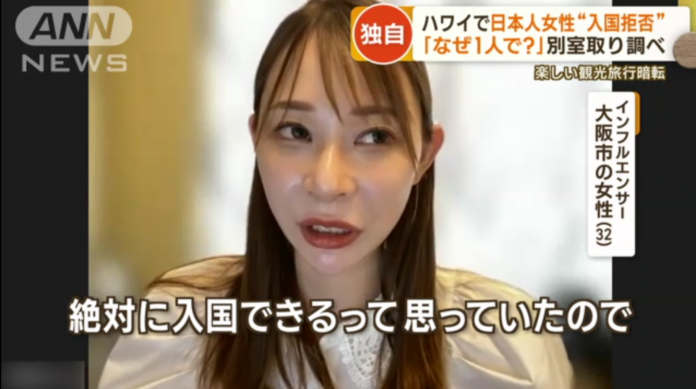Cases of young Japanese women being denied entry and forcibly repatriated when visiting Hawaii for tourism purposes have been rapidly increasing. What could be the underlying reasons for this?
Extended Interrogations in Separate Rooms – Treated Like Criminals
A 32-year-old influencer residing in Osaka expresses her frustration: “I absolutely believed I could enter without any issues, so I told them everything truthfully. However, they viewed me with suspicion, as if I were lying about everything. It was painful to suddenly feel so helpless and humiliated.”
This statement comes from a female influencer living in Osaka. She had planned a 3-night, 5-day vacation in Hawaii starting on the 1st of this month. However, an unexpected situation arose during her entry inspection upon arriving in Hawaii.
Inspector: “Where will you be staying?”
Woman: “At a hotel.”
Inspector: “Why did you come alone?”
Woman: “I’m meeting friends in Hawaii.”
Inspector: “You seem suspicious. We’ll conduct further inquiry in a separate room.”
She was then taken to a room within the airport, where she encountered local police officers.
Police Officer: “What is your occupation?”
Woman: “I’m an influencer.”
Police Officer: “Why didn’t you book the hotel yourself?”
Woman: “My friends booked it for me.”
Police Officer: “Why do you have so many clothes in your luggage? Are you here for work?” Woman: “I change outfits and take multiple photos. I’m not here for work.”
The woman had obtained all the necessary travel authorizations for entering the United States. However, she reports that she underwent lengthy interrogations at the airport.
Osaka resident: “They took my fingerprints, saliva samples, and photos, treating me like a criminal. Despite repeatedly saying I came for tourism, they insisted I was here for work. I was scared and didn’t know what to do.”
Ultimately, she was denied entry, forced to return to Japan on the next day’s flight, and wasted a round-trip airline ticket costing 200,000 yen.
Suspected of Prostitution? – A Rapid Increase in Inquiries from Young Women
A woman who had entered Hawaii without any issues during her previous two visits now wonders why she was denied entry this time.
Chisato Sato, an administrative scrivener familiar with U.S. visas, explains: “There has been a significant increase in Asian women going abroad for sex work or to work as escorts, seeking high earnings. U.S. immigration authorities have taken notice of this and are vigilant towards terms like ‘sugar daddy’ arrangements or ‘escort’ services. It’s not just in Hawaii; we receive many inquiries about entry denials related to suspected prostitution in Los Angeles, Las Vegas, and New York. At one point, we had as many as eight inquiries in a month, which is an unusual situation.”
After the COVID-19 pandemic, there has been a surge in Asian women going abroad for sex work with the expectation of high rewards. Consequently, there is a continuous stream of inquiries from young women denied entry. On social media, there have even been job postings that appear to promote high-paying sex work.
Job Listing for Overseas Work, Provided by a Source: “Hostesses, models, and attractive individuals especially welcome! Potential earnings start at 4 million yen for four weeks, and accommodations include a villa with a pool.”
Long-lasting Consequences of Entry Denial – “A 10-Year Ban”
Women denied entry also feel as though they were suspected of involvement in prostitution by local police.
Osaka resident: “They asked if there would be angry people waiting for me in Japan since I couldn’t enter Hawaii. They seemed to think I was solely there for prostitution. I had no such intentions, and it was quite a shock.”
Experts point out that even professions like influencers, which can be pursued anywhere, may carry the risk of entry denial.
Administrative scrivener Sato: “The nature of these professions can be somewhat ambiguous, and they can be carried out from anywhere. It’s possible to move your base to the U.S. and earn income while staying there.”
Once denied entry, the consequences can extend over a long period.
Administrative scrivener Sato: “U.S. immigration laws state that individuals with a criminal record or clear involvement in prostitution are not allowed to enter the country. If applied, this means you won’t be able to enter the U.S. for 10 years.”
Source



